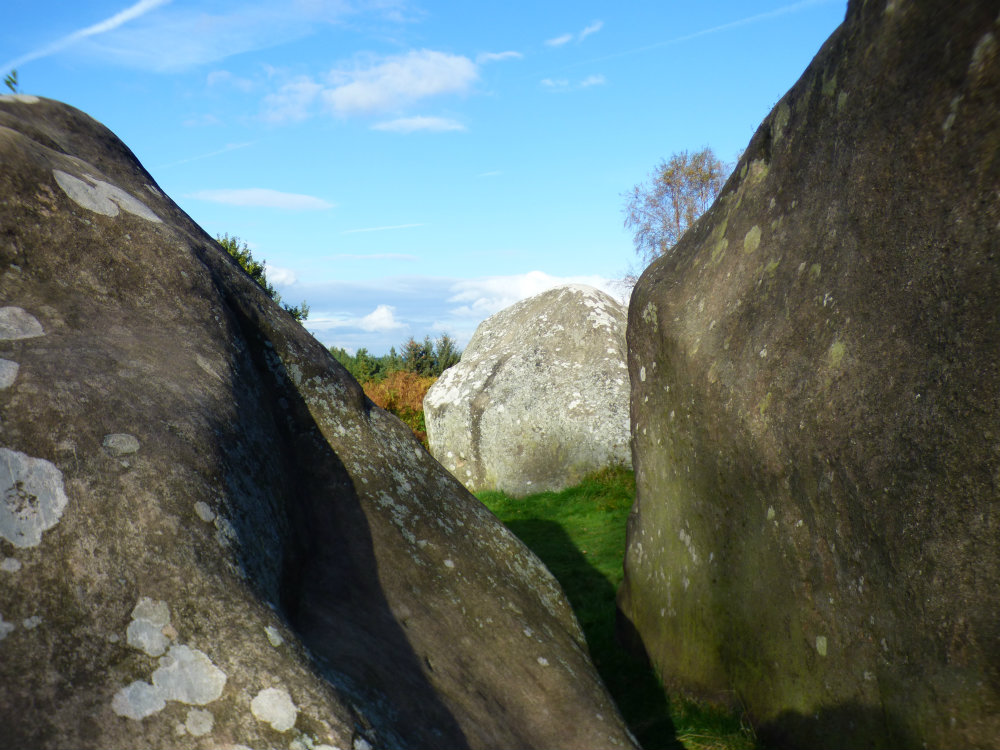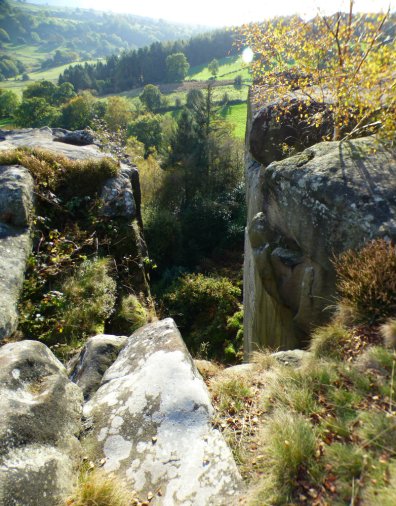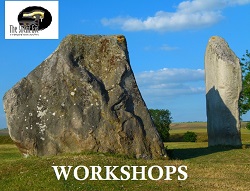
We left Robin Hood’s Stride reluctantly, knowing that we would have to come back…. there was much more to explore and experience there. On the other side of the ancient port-way that divides the two sites is was appears to be a similar pile of rocks… Cratcliffe Crags.

Things are a little different here as it is an acknowledged ancient hillfort, although when you start Googling, you might not think so as little seems to have been published about the site. The term ‘hillfort’ is a misleading and inclusive one, applied to many different structures from earthen banked enclosures to defended, stone-built ones such as this.

The stones themselves are mainly earth-fast boulders of huge proportions, though traces of the ‘walls’ remain, better visible when the bracken is low. Traces of the banks and walls surround one side, but the other side of the crags has its own, natural defence.

Climbing the hill, you find the crags open out on to several levels of platform, with a sheer drop down the cliffs to Owl Gully below. The tops of these cliffs are interesting. In one area, the rocks seem shaped to take the prone body of a man (or a hobbit, I tried it for size). Were they used for some ritual purpose or perhaps for air burial? A strange feeling about that as you feel your back mould itself to the stone and see only sky.

In some places the edges are protected by substantial boulders, some appearing to be worked. In others, the cliffs are sheer and dangerous, dropping down around a hundred feet to the gully below. Climbers call one of these cliffs the Suicide Wall…and you have to wonder at the name. There is a sense of old death here… whether a punishment for transgression or merely a place to face fear as some rite of passage.

It was another odd sensation. We had no problem clambering about the rocks or exploring the cliff edges…except at one particular spot, not even the highest, that spooked the pair of us. The rest of the time, quite apart from the glorious view, we were too interested in the curious weathering on the obvious working of the stone in places where the ‘bowls’ have the kind of squared form and edges that cannot be natural.

There are other traces too, of a life long-forgotten. People once lived, loved, laughed and worked here.You can see the mark of their lives in the stones, serving purposes we know longer recognise, reminding us of something hidden deep in the memory of our race.

We may not understand why they shaped the stones or for what they were used, but they are reminders of a distant past lived by people we can call our forefathers. People were born and died here…and something of their life seems to linger in a silence broken only by the breeze and the rustling of startled creatures.

From here, in spite of the planted lines of hedgerows and the distant, snaking lane, the landscape looks almost untouched. It is an illusion, but a beautiful one. Rural England becomes Albion, that magical and timeless land of the inner heart, and for a moment there seems to be no time between our far yesterday and today.

The rocks of the cliffs reminded me of a great bird…the weathering its feathered wings, outstretched to embrace the land. A tragic likeness, when the eagles of England are no more. From another angle, they reminded me of a bear…and our bears are long-since gone. As we left the cliffs, heading for a sacred place, I could not help but wonder if, one day, another woman would stand where I had stood, looking back across the ages and out across the land… and what would be left of this beauty for her to see.

The distance between then and now is measured in neither time nor miles, but in the human choices that have shaped our world. From the first carved stone to the highest skyscraper, from the first arrowhead to the newest missile, they continue to do so. We live on a beautiful planet and we do have a choice. We owe it to ourselves and to the earth that is our home to make it a wise one.



